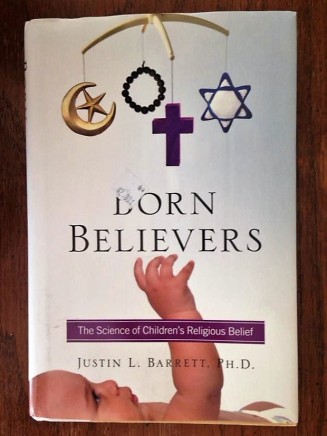
Justin Barrett is a Christian developmental psychologist. His thesis in Born Believers is that human beings are born with cognitive faculties that will naturally produce belief in gods/God.
Pros:
– Barrett presents many fascinating experiments on child development (I tried several out on my kids) to support his thesis, including:
– Agency detection. Young children quickly learn to distinguish inanimate objects like rocks from animate objects, which have goals and make choices (Chapter 1)
– Purpose detection. Young children are inclined to look for the purpose behind events and to think that objects are directed towards some end. (Chapter 2)
– Design detection. Young children recognize that human beings create tools, but that they do not design natural objects like trees or mountains (Chapter 3)
– Knowledge. Young children assume that other agents have only true beliefs (Chapter 4)
– Morality. Children recognize that moral facts are objective, and are not created by mommy’s whims or cultural expectations (Chapter 5)
– Based on these experimentally-supported tendencies, it’s not hard to see why children are primed to believe that there exists an agent who created and designed the universe for a purpose, who has superknowledge, and who adjudicates moral claims.
– Barrett rebuts the popular, but false, ‘indoctrination hypothesis’, which states that all religious claims are propagated by childhood indoctrination. He points out that if this theory were true, then all religious belief would die out within a few generations due to attrition.
– Interesting anecdotal examples of cognitive development and the ‘naturalness’ of theism, especially reports from perplexed atheist parents talking about their children’s religious beliefs
– Barrett makes a good distinction between ‘natural religion’ (by which he means a tendency to believe in gods/God) and ‘theology’, by which he means specific content about God. Children are naturally inclined to the former (and to belief in ghosts, spirits, etc…), but not to the latter.
Cons:
– Uneven. Part 1 was excellent and objective. Barrett’s Christian beliefs were tangential to the discussion and he concentrated on experimental evidence. In contrast, Part 2 reads more like a substandard attempt at proselytization. If I were an atheist, I would have disliked the self-congratulatory and almost mocking tone of ‘How to be a confident atheist’ in Chapter 9.
– In discussing practical ways in which parents can “introduce their children to God”, Barrett makes a *huge* leap from ‘theism is natural’ to ‘theism is rational and true.’ Plenty of childhood beliefs are natural, but nonetheless irrational and false. For example, it is natural for young children to believe that the earth is stationary. However, evidence shows so clearly that the earth is rotating that it would be extremely irrational for an adult to hold this false belief, or to teach it to their children. Since Barrett provides no evidence whatsoever that theism (much less any particular religion) is true, Part 2 will be of little interest to non-theists and may even reinforce their belief that theology *is* irrational and is only propagated by childhood indoctrination.
– Relatedly, it’s unclear why Barrett is interested in helping parents propagate their ‘religious beliefs’ per se. Presumably, Barrett thinks there are at least some religious beliefs that are false and even actively harmful (e.g. “cancer is caused by ghosts”). Rather than giving blanket advice on how to share our faith with our kids, he should probably say something about how we know that our religious faith is true and worth propagating in the first place.
Summary:
Part 1 is excellent and full of experimental data. Part 2 contains some helpful tips for parents on how to convey their religious faith to their children, but is hamstrung by its failure to address the question of how we know our beliefs are true.